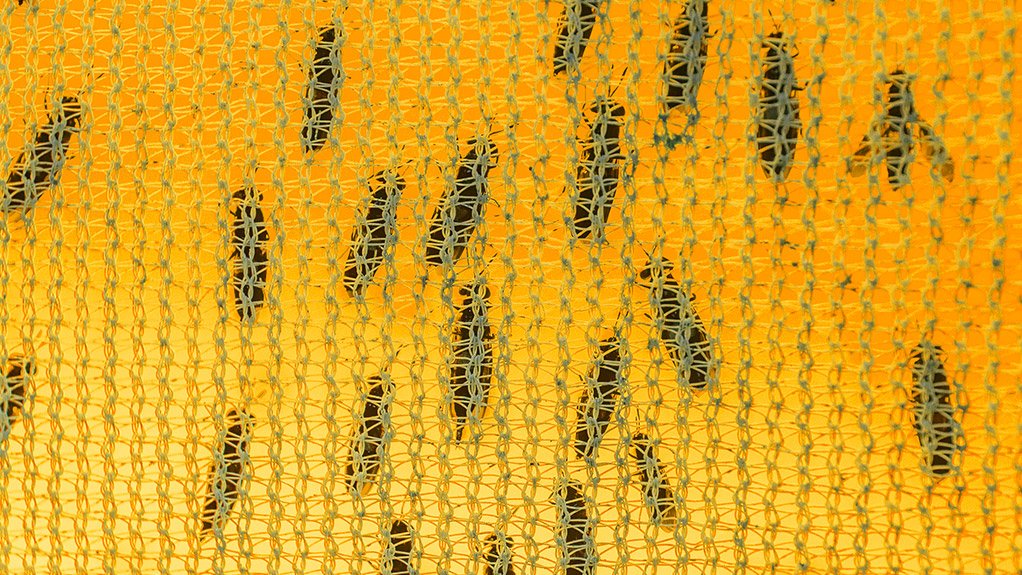Maggot farmer to expand from Cape Town to California
The company behind the world’s first industrial-scale maggot farm based on organic waste plans to kick off its international expansion with a plant in California next year, taking advantage of two global problems: a shortage of protein and an abundance of trash.
The plant in Jurupa Valley will be followed by operations in the Netherlands and Belgium, and is part of a drive by AgriProtein and a handful of competitors worldwide to tap into demand for high-grade protein for fish and poultry feed and offer a solution for the unwanted organic waste that cities and farms produce.
“The world is long on waste and short on protein,” Jason Drew, AgriProtein’s CEO, said in an interview.
The California operation will be modeled on the facility in Cape Town, which rears black soldier flies on about 250 metric tons of organic waste daily. The flies’ larvae are then harvested to produce 4 000 metric tons of protein meal a year. At any one time, including eggs, there are 8.4-billion flies in the factory.
The plant also produces 3 500 t of fatty acid oil and 16 500 t of frass, or maggot droppings, which is used as fertilizer. Each facility costs about $42-million to build and can generate $13-million to $15-million in annual revenue.
AgriProtein is competing with the Netherlands’s Protix, France’s Ynsect and Innova Feed, Canada’s Enterra Feed Corp and US company EnviroFlight. All use the black soldier fly, except Ynsect, which breeds mealworms.
‘COMPELLING STORY’
Practically nonexistent a decade ago, maggot farming is increasingly fashionable because it’s environmentally friendly and has the potential to grow exponentially.
AgriProtein, which Drew said is mainly owned by the private investment offices of wealthy individuals and falls under the Insect Technology Group holding company, raised $105-million in 2018. Ynsect announced a $125-million capital raise this year.
“Insects come with a really compelling story. They can turn low-value waste into high-value protein,” said Beyhan de Jong, an animal-protein analyst at Rabobank Group in the Netherlands. The companies are all bringing factories into commercial production, but AgriProtein is “going for more international expansion than its peers,” she said.
While meal and dried maggots can be fed to fish, poultry and pigs, as well as pets, the primary market is seen as aquaculture. Insect feed could eventually displace fishmeal, which is made from wild-caught fish and fed to salmon and other commercially farmed species. Annually, 20-million tons of fishmeal is produced.
Demand for protein feeds made from insects in Europe alone could be 1.2-million tons by 2025, said De Jong. However, regulations in Europe -- over the types of waste that can be used and in which forms the insect products can be fed to animals -- make expansion more difficult than in South Africa and California.
Current European Union regulations only allow the use of so-called pre-consumer waste, or waste from manufacturing processes. South Africa, in contrast, allows catering waste.
TRACTOR SHED
Still, companies such as Protix are now running commercial-scale operations and considering expansion. In May, Protix opened its second factory, a 40-million euro ($36-million) plant that can process 70 000 to 100 000 tons of waste a year, according to Kees Aarts, the company’s CEO.
Protix is marketing its products to consumers through innovative methods such as OERei, eggs produced by chickens fed only on maggots, and is looking at Southeast Asia, he said. In addition to meal and oil, it sells live maggots that are fed to chickens. It has received hundreds of approaches about setting up plants, Aarts said.
“The planet is in quite a hurry,” he said.
Most of the companies have come from humble beginnings.
The idea to create AgriProtein started with experiments in a tractor shed at Drew’s farm in Tulbagh in South Africa’s Western Cape province in 2008. Since the plant in Cape Town opened in 2016, the company has focused on coming up with the correct design and products rather than output, but is now ready to expand, he said.
“We will need more capital at some stage, in 2020,” Drew said.
DUNG BEETLES
AgriProtein has an experimental plant in the South African coastal city of Durban where the flies are being fed on manure and sewage. It’s also worked with African dung beetles and wax moths, which could potentially eat plastic, he said.
While consumers will take some convincing, there is potential, said De Jong.
“Consumers also look for a story,” she said. “They are marketing their products as being more sustainable. It’s a growing concept.”
Article Enquiry
Email Article
Save Article
Feedback
To advertise email advertising@creamermedia.co.za or click here
Announcements
What's On
Subscribe to improve your user experience...
Option 1 (equivalent of R125 a month):
Receive a weekly copy of Creamer Media's Engineering News & Mining Weekly magazine
(print copy for those in South Africa and e-magazine for those outside of South Africa)
Receive daily email newsletters
Access to full search results
Access archive of magazine back copies
Access to Projects in Progress
Access to ONE Research Report of your choice in PDF format
Option 2 (equivalent of R375 a month):
All benefits from Option 1
PLUS
Access to Creamer Media's Research Channel Africa for ALL Research Reports, in PDF format, on various industrial and mining sectors
including Electricity; Water; Energy Transition; Hydrogen; Roads, Rail and Ports; Coal; Gold; Platinum; Battery Metals; etc.
Already a subscriber?
Forgotten your password?
Receive weekly copy of Creamer Media's Engineering News & Mining Weekly magazine (print copy for those in South Africa and e-magazine for those outside of South Africa)
➕
Recieve daily email newsletters
➕
Access to full search results
➕
Access archive of magazine back copies
➕
Access to Projects in Progress
➕
Access to ONE Research Report of your choice in PDF format
RESEARCH CHANNEL AFRICA
R4500 (equivalent of R375 a month)
SUBSCRIBEAll benefits from Option 1
➕
Access to Creamer Media's Research Channel Africa for ALL Research Reports on various industrial and mining sectors, in PDF format, including on:
Electricity
➕
Water
➕
Energy Transition
➕
Hydrogen
➕
Roads, Rail and Ports
➕
Coal
➕
Gold
➕
Platinum
➕
Battery Metals
➕
etc.
Receive all benefits from Option 1 or Option 2 delivered to numerous people at your company
➕
Multiple User names and Passwords for simultaneous log-ins
➕
Intranet integration access to all in your organisation





















